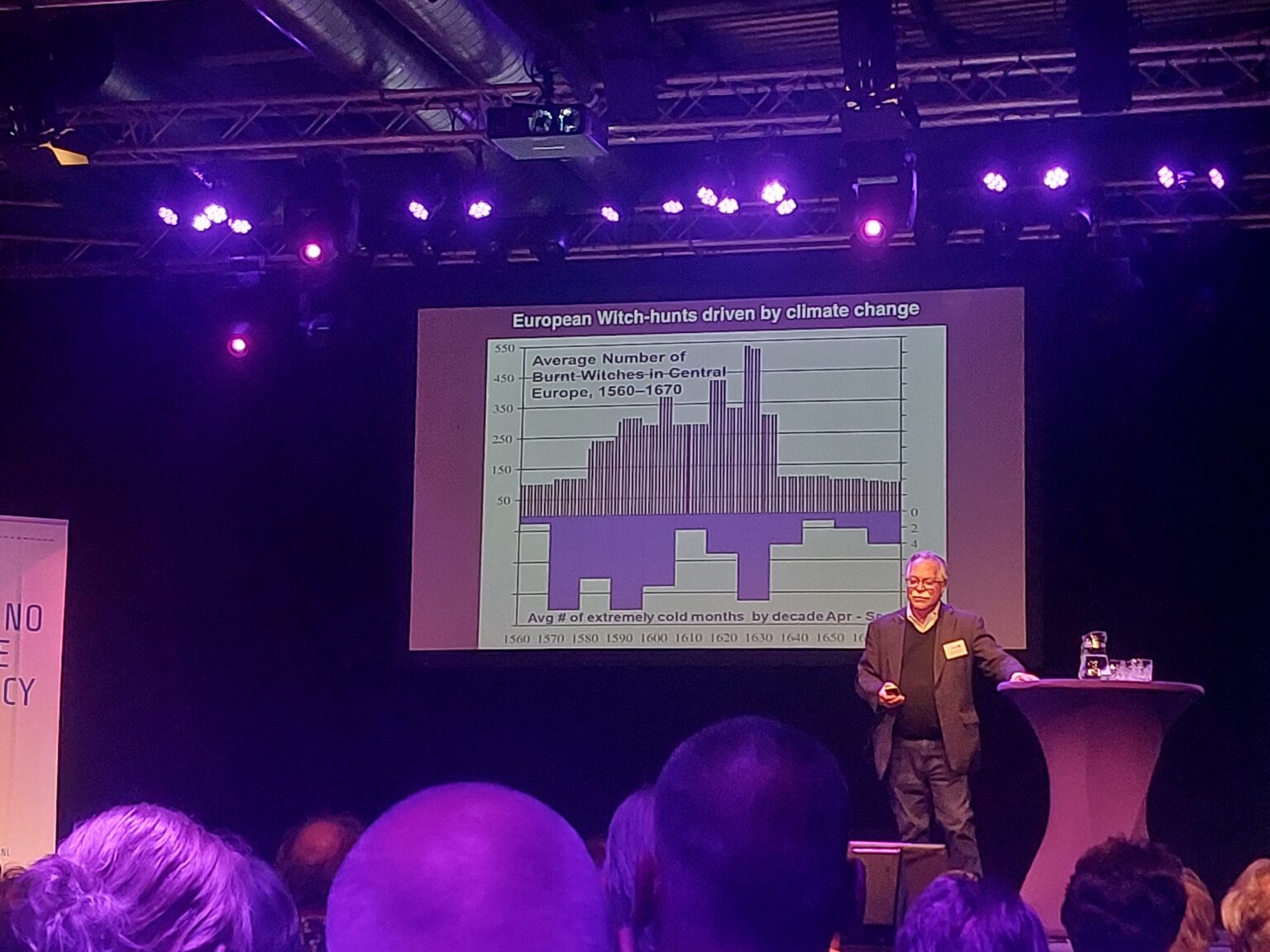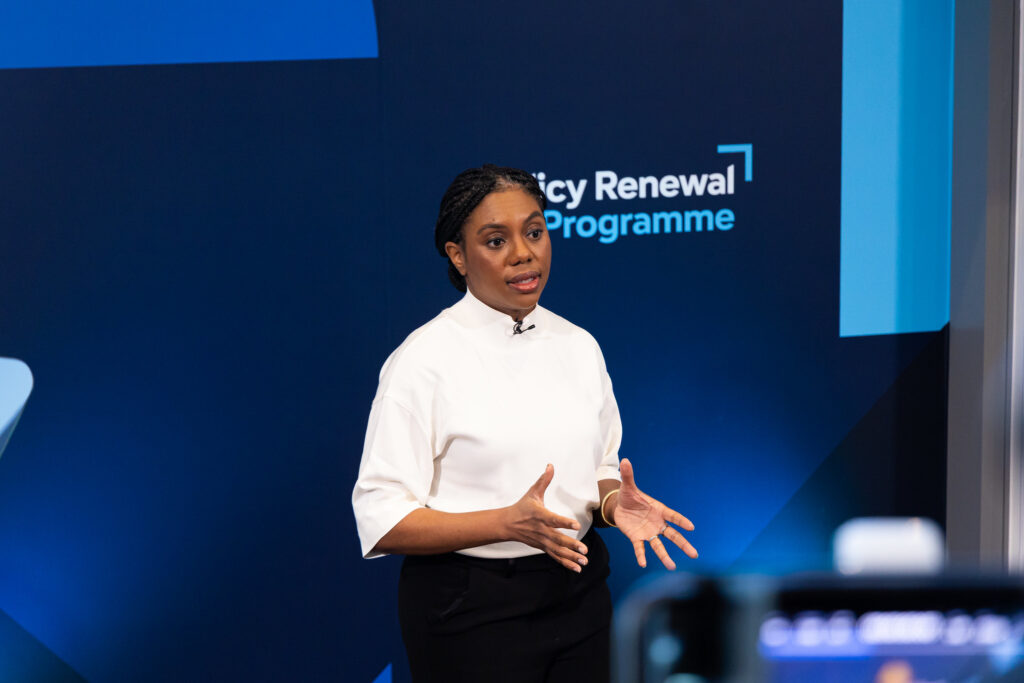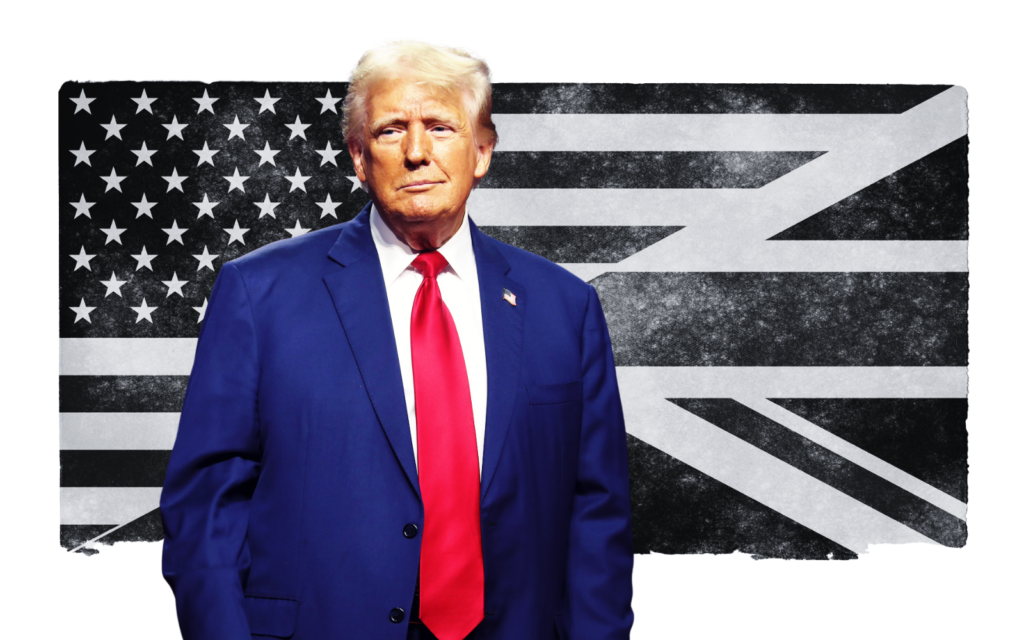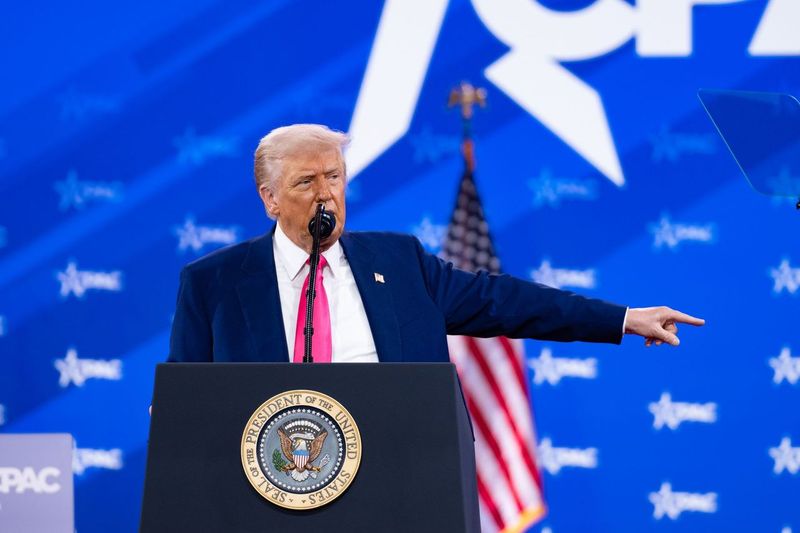“I embrace that high carbon lifestyle […] CO2 is showing huge, huge benefits, and so we should celebrate it,” U.S. climate science denier Gregory Wrightstone tells the audience.
Welcome to Clintel’s fifth anniversary celebration. Here, windmills are referred to as “bird choppers,” and carbon dioxide is not something to fear, but rather a “miracle molecule” that we should emit more of, not less. Apparently, according to Wrightstone, the levels of CO2 in the atmosphere are now so low that the planet is experiencing a “CO2 famine.”
Clintel (short for the Climate Intelligence Foundation), the Netherlands’ best-known climate science denial group, has chosen a remodelled warehouse in the small town of Roelofarendsveen, a 20-minute drive from Schiphol Airport outside Amsterdam, for its conference. Near the entrance, balloons decorate a blue and white banner emblazoned with Clintel’s slogan: “There is no climate crisis.” Although the rundown conference hall may not be the most charming location, co-founder and director Marcel Crok is optimistic about the future: “The next celebration will be in the RAI in Amsterdam,” he said, referring to a 12,900-seat venue in the nation’s biggest city, host to events such as the Eurovision Song Contest.
On June 18, around 120 paying attendees gathered to listen to talks from Clintel’s co-founders Guus Berkhout — a retired geophysicist with a background in the oil and gas industry — and Crok, an independent author and journalist. The international panel of speakers featured well-known and controversial climate science deniers, including aerospace engineer Willie Soon and Wrightstone, a geologist and executive director of the U.S.-based CO2 Coalition, an organisation Clintel is increasingly looking to for support.
Established in 2015, the CO2 Coalition is dedicated to “educating thought leaders, policy makers, and the public about the important contribution made by carbon dioxide to our lives and the economy.” The Coalition has received funding from the Koch brothers — the right-wing libertarian U.S. oil billionaires who have been at the heart of climate change denial in the United States — and the Mercer family, who provided financial backing to former U.S. President Donald Trump for his successful election bid in 2016.
The conference organisers had turned several tables into book displays, showcasing a wide selection of publications in Dutch and English. Among them was Wrightstone’s latest publication A Very Convenient Warming, launched that day in Dutch. Two comic books published by the CO2 Coalition purported to explain “the scientific method” to children.
Looking around Hall 60, it would have been easy to dismiss Crok’s optimism. The conference was far from sold out, and most attendees were elderly men who appeared eager for something to get involved with during their retirement. Participants listened attentively to the extensive presentations, and cheered and applauded energetically throughout the day. But while it may be tempting to assume Clintel and its audience are mostly irrelevant, their reach and influence extend far beyond Roelofarendsveen’s industrial area.
A Favourable Climate
In fact, Clintel has the wind in its sails. On July 2, the Netherlands witnessed the inauguration of the first government led by the extreme-right Party for Freedom (PVV), reflecting a broader surge in support for far-right politicians at last month’s elections to the European Parliament. In the run-up to the Dutch elections in November, PVV’s leader Geert Wilders suggested putting the country’s climate policies “through the shredder.” In his manifesto, Wilders pledged to end the “fear-mongering” of climate scientists, arguing that their “doom scenarios” have not materialised. PVV members of parliament have cited Clintel publications during national policy debates.
The recently founded Boer Burger Beweging (BBB), a party that grew out of the Dutch farmers’ protests against European Union nitrogen regulations, is part of the multi-party government as well. While the BBB is not entirely dismissive of climate change, it is very critical of any type of regulatory solutions or fixed emissions reductions targets, instead supporting voluntary and incentive-based policies.
The Dutch media landscape has also shifted in Clintel’s favour since 2019, when the new and controversial right-wing media organisation Ongehoord Nederland (ON) secured a licence to broadcast a talk show on Dutch public television. While climate deniers had previously been given little serious attention by Dutch media, Clintel has been invited onto ON’s talk show at least six times since its launch. The show reached an average of 138,000 Dutch viewers for every episode in 2022.
Clintel has cultivated links with a vocal web of climate deniers since its launch. In 2019, the organisation’s one-page World Climate Declaration, sub-titled “There is no climate emergency,” formed the basis of an open letter to the European Union and the United Nations. Many of the hundreds of signatories were affiliated with libertarian think tanks such as the U.S.-based Cato Institute, the Heartland Institute, and the London-based Institute of Economic Affairs — back then all well-known partner organisations of the Koch-funded Atlas Network. This global collective of more than 500 think tanks champions unfettered free market economics, and many of its partner organisations have histories of spreading climate denial, doubt, and delay.
Clintel’s World Climate Declaration was referenced by U.S. Senator Ron Johnson [R-WI], during a Senate committee hearing held on May 1, 2024 as part of an investigation into the oil industry’s attempts to avoid accountability for climate change. “You ought to take a look at that,” Johnson suggested to the committee members, referring to the declaration.
While it is embedded in a global movement, Clintel’s funding seems to come from a largely Dutch-based network of deep-pocketed private individuals and smaller donors. Dutch real estate investor Niek Sandmann supported Clintel’s launch with a pledge of half a million euros. A Clintel newsletter from 2022 stated that the organisation also received a “generous donation” (the amount was 750 euros, Clintel later told DeSmog) from Edward Heerema, sole shareholder of Dutch company Allseas, which builds platforms and pipelines for the oil and gas sector, including clients such as Royal Dutch Shell.
Financially, Clintel seems to be thriving. Public records show its annual revenue almost doubled to 202,952 euros in 2022 from 104,547 euros in 2019. An analysis by the Platform for Authentic Journalism, a Dutch investigative journalism collaboration, revealed that 54 percent of Clintel’s total revenue between 2019 and 2022 came from unspecified “private entities,” the rest being covered by Sandmann (22.4 percent); non-profit organisations (16.4 percent); companies (3.3 percent); and publications, lectures and other activities. Clintel told DeSmog that it does not receive grants from the oil industry.
Clintel has used this money to organise multiple live events over the years, and launch a campaign against wind turbines in the Netherlands using arguments that have long since been discredited. Clintel also recently helped to promote and distribute the climate denier film Climate: The Movie, full of debunked myths, including that global temperatures aren’t increasing. The film has been watched 634,827 times on Clintel’s YouTube channel. Clintel videos, and those featuring co-founders Crok and Berkhout, have had 2.34 million views.
‘Did You Come up With This?’
In Roelofarendsveen, the day’s programme was an all-you-can-eat buffet of the many flavours of climate science denial. Narratives on offer ranged from “climate change is happening but not due to human activity” to “the adverse effects of climate change are exaggerated or non-existent” and “climate change is occurring, is caused by humans, but has beneficial outcomes.”
For the audience, these apparent contradictions did not seem to matter much. After all, they all point to the same conclusion: It’s not worth spending money to tackle the problem. Theo Wolters, who is editor of Climategate, a climate science denial website, presented the conveniently rounded number of one million euros per Dutch family to make the Netherlands climate neutral. Gasps could be heard from the audience, because Wolters’ calculations amount to 4.5 trillion euros, or almost four-and-a-half times the size of the Dutch economy. “It can be half a million, it can be two million. But this is what my spreadsheet says at the moment,” Wolters said.
Wolters, who also founded the European Climate Realist Network, a Dutch-based informal umbrella group for organisations across Europe that see themselves as “climate realists,” later admitted to DeSmog that these were — in his words — “bizarrely high figures,” based on an extrapolation of current trends. Wolters added: “No one has a sensible idea of what that fossil-free energy supply could look like, and so you cannot reliably calculate its costs.”
Seen from this perspective, the threat of climate change is merely an excuse used by governments and international institutions to tighten control over people’s lives, aided by compliant media organisations. Responding to a request for comment after the conference, Crok said he considered DeSmog’s coverage to be the opposite of “real and reliable”. “It has only one purpose: to vilify anyone who criticises the alarmist climate narrative,” he said.
In his talk, Jacob Nordangård, author of books such as The Global Coup d’Ètat and Rockefeller: Controlling the Game, supposedly identified those responsible. He spun a 30-minute yarn of global elites; Dutch and British Royalty; shadowy research agendas; and “Great Reset” conspiracy theories, which left even the host of the talk jokingly wondering out loud: “Did you come up with this yourself?”.
Nordangård later told DeSmog that he considers the questions he is asking about global power dynamics to be a legitimate area of study, arguing that it would be contradictory to characterise his work as a “conspiracy theory” when it shares parallels, in his view, with DeSmog’s research into the fossil fuel industry’s funding of climate denial.
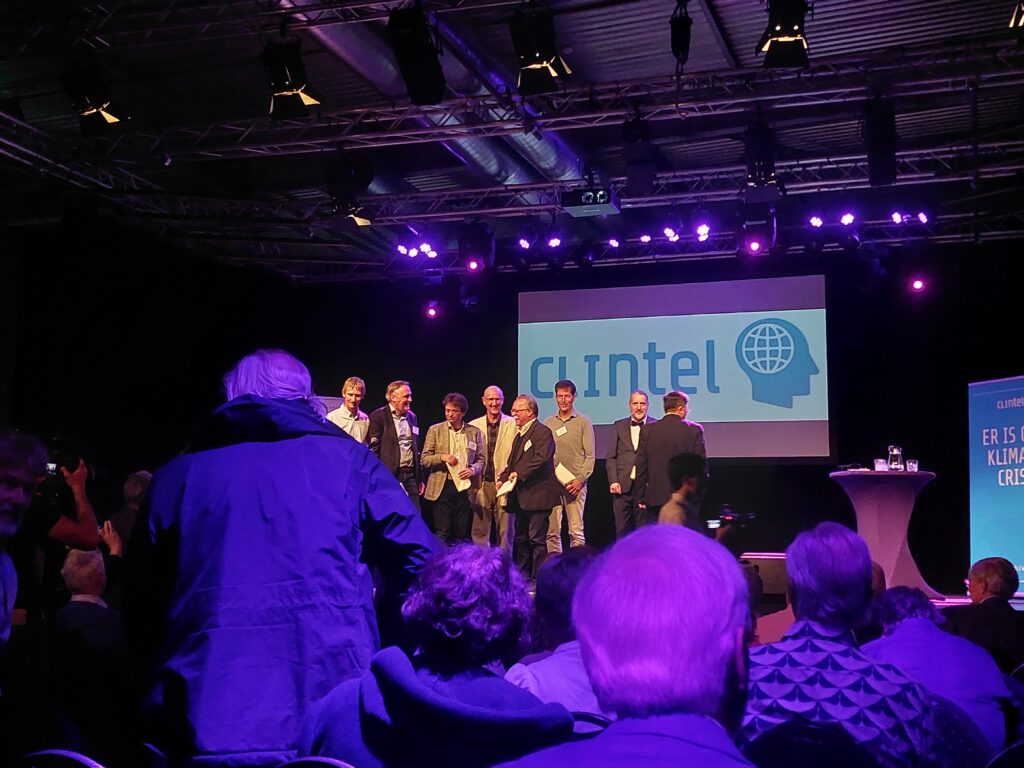
Climate in the Courts
Another central topic at the conference was the recent surge in climate litigation cases against governments and corporations.
Crok, the Clintel co-founder, titled his lecture Should the Climate War Be Won in Court? His answer to his own question was “No”. However, as long as these cases continue to be pursued, Clintel plans to make the best of it. Dutch law allows parties with a provable interest in a pending case to request permission to intervene. Clintel wants to use this avenue to challenge climate science and policies in the courtroom.
The Netherlands has seen two notable, successful climate cases. In 2015, the Hague district court ruled in Urgenda vs. The Netherlands that the Dutch state must reduce greenhouse gas emissions to 25 percent below 1990 levels by 2020. The country’s Supreme Court subsequently upheld the ruling.
In 2021, Milieudefensie (the Dutch chapter of the environmental group Friends of the Earth), along with other environmental organisations, and more than 17,000 citizens, successfully sued Shell. Shell appealed the ruling, in which the Hague district court ordered the company to reduce its emissions by 45 percent by 2030. (The ruling applies to the direct emissions from Shell’s operations, while the company must also make a ‘best-effort’ reduction in its indirect emissions, which constitute 95 percent of its total emissions).
In October 2022, Clintel made filed a motion to intervene in the appeal proceedings of the Milieudefensie vs. Shell case. Clintel contended that the U.N.-backed Intergovernmental Panel on Climate Change (IPCC) had not conclusively proved “dangerous climate change” and the court should therefore not issue a ruling based on its findings.
In April 2023, the Court of Appeal in the Hague rejected Clintel’s request, deeming that Clintel lacked a “sufficient interest” in the case. The court also noted that “the role of a joined party is limited to supporting the position of the party to whose side they join [and that] Clintel’s position on the state of climate science differs from that of Shell or Milieudefensie.”
Meanwhile, the eurosceptic Frans van der Werf spearheaded the launch of a new foundation called Milieu & Mens (Environment & People), expressly to participate in the Shell case. Its self-described mission is to “level the playing field with respect to environmental organisations”. To bolster its legal standing, Milieu & Mens said it was representing a group called Concerned Energy Users, set up to oppose climate regulations that could increase energy prices.
Soon after the launch of Milieu & Mens in February 2022, Crok posted on LinkedIn, that he and lawyer Lucas Bergkamp had come up with a new “plan” to intervene in the Milieudefensie vs. Shell case, and encouraged people to sign an online petition launched by Concerned Energy Users. Milieu & Mens has, however, adamantly denied any affiliation with Clintel. Milieu & Mens did not respond to a request for comment.
In early 2023, Milieu & Mens filed an application to serve as a “joined party” with Shell on behalf of Concerned Energy Users. This time, the court ruled in favour of Milieu & Mens: “M&M fears that the prices of fossil fuels will rise as a result of the allocation of those claims. Therefore, M&M has an interest in joining.”
The CO2 Coalition has also got involved in the case. In November 2023, William Happer, the group’s chair and co-founder, wrote an expert opinion for Milieu & Mens together with noted U.S. climate science denier Richard Lindzen, a former professor at MIT, and Steven Koonin, a former chief scientist for the oil major BP, who is now a professor at New York University.
Clintel appears to have developed a liking for this type of legal strategy. At the conference, Crok proudly informed the audience that the organisation is preparing to intervene in future cases, starting with Milieudefensie’s climate case against Dutch bank ING, announced earlier this year. As soon as this case is officially filed, Clintel will try to join in, Crok said.
What the effects will be, beyond publicity, remain to be seen. M&M’s intervention in the Shell case, however, led to several months of delay. “Bad news for the climate and bad news for those worldwide who are already suffering the consequence of the climate crisis,” wrote Milieudefensie. A verdict on Shell’s appeal is expected in early November.
‘Teach Us How’
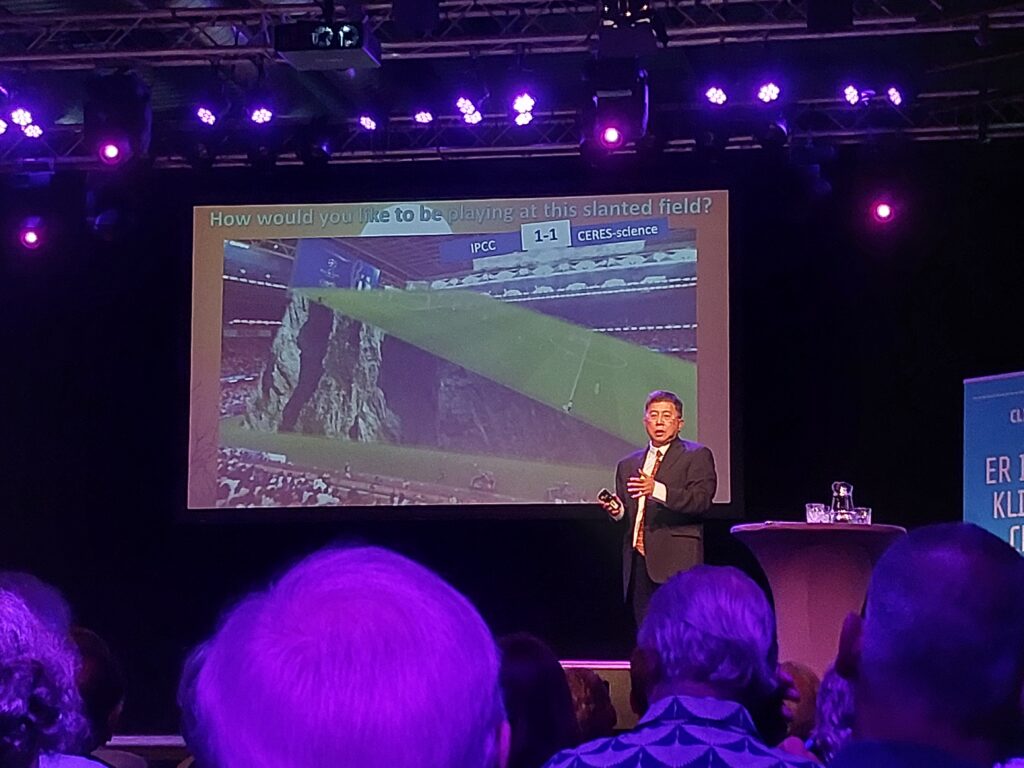
In Hall 60, the day ended with a talk by charismatic keynote speaker Willie Soon, the aerospace engineer, peppered with memes. These included a football meme showing the IPCC and Soon’s foundation drawing 1-1, despite a distinctly uneven playing field.
If this is the first half of the match, Clintel definitely hopes to tip the score in their favour after the break. Next year, Clintel will have more people and more money, Crok promised, after handing the speakers their thank-you gifts, packets of paling (smoked eel).
To succeed, they are turning to their U.S.-based allies, the CO2 Coalition, for advice.
“Gregory [Wrightstone] and I will have a meeting tomorrow. The CO2 Coalition is now growing rapidly, they have much more funding than we have,” Crok told the audience. “But tomorrow, he is going to teach us how to do it.”
Subscribe to our newsletter
Stay up to date with DeSmog news and alerts


